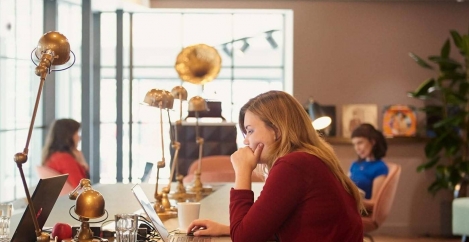September 25, 2017
People who work in coworking spaces believe they are more productive
 People who work in so-called coworking spaces claim they are more motivated and have more positive interactions with others, according to a new report. The report by Staples Solutions, called Collaboration Generation: The Rise of Millennials in the Workplace, details the trend in collaborative working, in addition to what attracts the millennial generation to business. Since 2010, co-working spaces worldwide have increased by 5,519 percent as the average office space per employee has decreased by 2.9 percent, the research reveals, with London seeing a reduction in traditional office space by 8.8 percent.
People who work in so-called coworking spaces claim they are more motivated and have more positive interactions with others, according to a new report. The report by Staples Solutions, called Collaboration Generation: The Rise of Millennials in the Workplace, details the trend in collaborative working, in addition to what attracts the millennial generation to business. Since 2010, co-working spaces worldwide have increased by 5,519 percent as the average office space per employee has decreased by 2.9 percent, the research reveals, with London seeing a reduction in traditional office space by 8.8 percent.
People who have gone from working in a traditional office to a co-working space have reported several benefits, including 86 percent saying they are more productive, 59 percent finding the space to be more organised, and 42 percent even reporting an increase in income.
The report sheds a light on the benefits of having an office that is geared towards collaboration, with 57 percent of those who use them working more frequently in teams. This is of particular relevance to the younger generation, who are looking for spaces conducive to communication. In fact, 7 in 10 millennials list the quality of workplace as a key factor when looking for a job and 69 percent would trade other benefits for a better workplace.
To understand why this type of working space is key to collaboration, Staples Solutions interviewed Professor Ulrich Weinberg from The School of Design Thinking, who says that variable workspaces should be the future of business culture.
“At the School of Design Thinking, we designed ‘We Q’ spaces, which are actually not ‘IQ’ representing the intelligence of a single person in the ‘I’ model – it’s more the ‘we’ qualities and we focus on that. We had to physically redesign the spaces […] working environments need to be redesigned and we are encouraging companies to do that. Self-organising teams don’t need a big hierarchical structure above them because they can do lots of things on their own. […] We are using the kind of structures which actually keep us away from really good solutions to complex problems. We just try to solve complex problems right now, but we don’t use the full mental capacities of our people […] we have to allow them and enable them to use their capacities in a new way.”
He argues that the working environment facilitates the thinking process – and asks businesses to stop functioning in a linear fashion. “We are encouraging people to join forces, building bridges between different departments and building cross-functional, small teams which can operate faster than big departments […] this offers new chances and lots of new opportunities”.


















